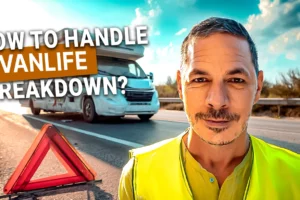
A Quick Guide to Avoiding Mistakes When Starting Vanlife
Introduction
Starting your journey into RV life is an exciting adventure, but there are some mistakes you should avoid to make the most of it. In this article, we will discuss important topics such as the importance of testing your van before buying, regular maintenance, the need for life tests, internet connectivity, and more. We will also share our personal experience to help you avoid these pitfalls and enjoy this adventure in the best conditions.
Not Testing the Van Before Purchase
Why is it Crucial to Test the Van Before Buying?
When you start your vanlife, it’s essential to take a test drive before purchasing your van. Why? Because this purchase represents more than just a vehicle: it’s your future home, your living space, and your workspace. A test drive ensures the van meets your expectations for comfort and functionality.
The Importance of a Test Drive
A test drive gives you the chance to see if the van is enjoyable to drive. Pay attention to acceleration, handling, braking, and road noise. All these elements are crucial for ensuring a pleasant and safe driving experience.
Checking Comfort and Features
During the test drive, check the comfort of the seats and the layout of the interior. Make sure the space is sufficient for your daily needs. Test features like the heating system, air conditioning if available, electronic equipment (infotainment, driver aids), and all the pumps, including the windshield washer pump. These are essential aspects that will make your vanlife more enjoyable.
Identifying Potential Problems
A test drive is also the perfect time to spot any mechanical issues. Be alert to unusual noises, vibrations, or abnormal performance. These signs can indicate underlying problems that, if not addressed, could cost you a lot in the future.

Why Ignoring Van Maintenance is a Mistake
Frequency of Maintenance (Oil Changes, Tires)
Regular maintenance of your van is crucial. For example, the oil should be changed every 3,000 to 5,000 miles (5,000 to 7,500 km) for newer models. Tires should be checked regularly and replaced when their wear reaches 4/32″ (1/8 inch). Neglecting these tasks can lead to costly breakdowns.
Understanding the Van’s Specific Needs
Every van has specific needs. Consult the owner’s manual for the manufacturer’s recommendations. This includes checking the brakes, cooling system, and filters. Being proactive with maintenance helps prevent major problems.
Consequences of Neglected Maintenance
Ignoring maintenance can have serious consequences: premature engine wear, braking issues, and a reduced vehicle lifespan. Without proper care, small repairs can turn into major, expensive overhauls. A well-maintained van is not only safer but also more reliable.
Why Not Doing a Vanlife Test Run is a Mistake
Importance of a Test Before Committing
Doing a vanlife test run before fully committing is crucial. It allows you to get used to the confined space and see if this way of living truly suits you. A test gives you a realistic idea of the daily challenges you might face.
Adjusting the Interior Layout
Testing vanlife helps you adjust the interior layout to your needs. You can see what works, what doesn’t, and adapt your space for optimal comfort. It’s a practical way to avoid costly mistakes and maximize the efficiency of your space.
Facing Daily Challenges
Living in your van for a few days exposes you to the daily challenges like managing water, electricity, and storage space. This experience is invaluable for anticipating and solving problems before fully committing to vanlife. A test better prepares you for the reality of this adventure.
Why Underestimating the Importance of Connectivity is a Mistake
Internet Needs for Work and Daily Life
In vanlife, a good internet connection is essential, especially if you work remotely. For many, the internet is vital not only for work but also for entertainment and daily communication.
Available Solutions (Hotspots, Special Modems, Starlink)
Fortunately, several solutions exist to stay connected on a road trip. Mobile hotspots like Visible offer affordable plans. Specific modems, with 12v power to save energy and dual SIM management to avoid disruptions, are also available. For more remote areas and when stationary, and although we haven’t had the chance to test it yet, Starlink seems to be an excellent option according to many reviews, with its satellite coverage, though it is costly.
Managing Areas Without Coverage
Despite all precautions, you will sometimes find yourself without coverage. It’s wise to have a backup plan: download content in advance, use offline maps, and know where you can access free Wi-Fi.
Why Neglecting Van Insulation is a Mistake
Importance for Thermal Comfort
After internet coverage, let’s talk about overall coverage. Insulation in your van is crucial for maintaining a comfortable temperature, whether in summer or winter. Good insulation reduces the need for heating and cooling, making your van more comfortable and energy-efficient.
Types of Insulation and Their Installation
There are several types of insulation: polyurethane foam, cork, Armaflex, and rock wool. Each material has its advantages. For example, polyurethane foam offers excellent thermal and sound insulation. The installation must be done carefully to maximize efficiency.
Preventing Humidity and Mold
Proper insulation helps prevent humidity and mold, common problems in vans. Using a moisture barrier and ensuring good ventilation is essential. A simple trick to combat humidity is to air out your camper van whenever possible, especially in the morning when you wake up.

Why Leaving the Water Tank Valve Open is a Mistake
Risks of Leaks and Contamination
Leaving the valve of the water tank open can cause leaks and water contamination. Stagnant water attracts bacteria and other contaminants, making the water unsafe to drink.
Best Practices for Managing the Water Tank
It’s crucial to close the valve after each use and to regularly empty and clean the tank. Use appropriate products to disinfect and maintain the tank.
Impact on Health and Van Maintenance
Clean water in vanlife is essential for your health. Leaks can damage the van, leading to high repair costs. Ensuring good water management guarantees a healthy and worry-free vanlife.
Why Not Understanding the Plumbing System is a Mistake
Essential Components and Their Maintenance
Your van’s plumbing system includes elements like the water pump, fresh and grey water tanks, and pipes. Make sure to regularly check and maintain these components to avoid problems.
Preventing Leaks and Blockages
To prevent leaks and blockages, regularly inspect fittings and seals. Use filters to keep debris from damaging the system.
Importance of Regular Maintenance
Regular maintenance ensures the plumbing functions properly and prevents breakdowns. Clean the tanks and replace worn parts to ensure worry-free use.
Why Neglecting Van Security is a Mistake
Basic Security Measures (Alarm, Locks)
Ensuring the security of your van starts with basic measures: installing an alarm and additional locks. These devices deter intruders and protect your van from theft attempts.
Securing Valuables
To protect your valuables, use a safe that is fixed to the van. Keep your most precious items out of sight and cover windows to avoid tempting potential thieves.
Advanced Security Solutions
For enhanced security, consider advanced devices like surveillance cameras for camper vans and GPS trackers.



